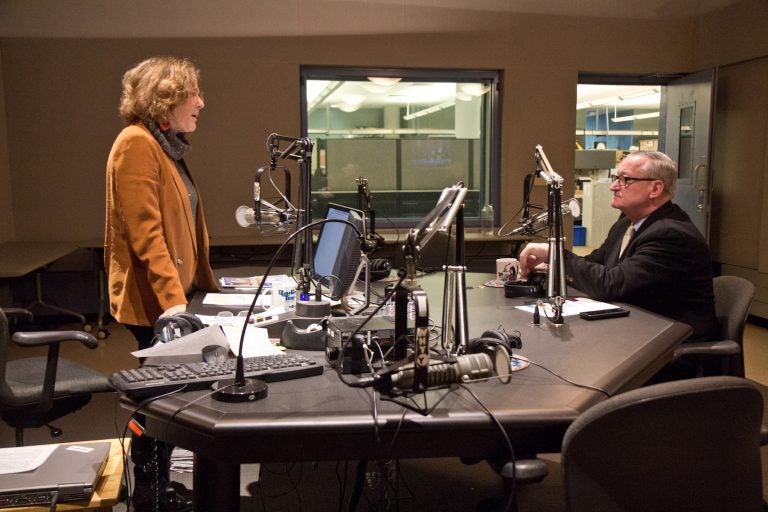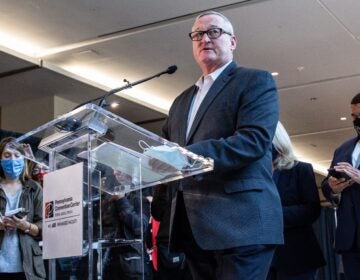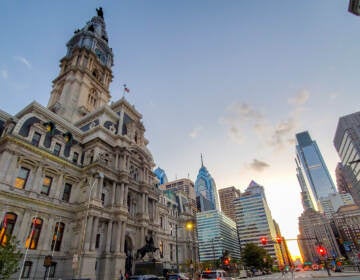Mayor Kenney on rich people, rude Philly and why a city driving tax will never happen
24 hours after taking the oath for a second term, Philadelphia Mayor Jim Kenney visited WHYY’s Radio Times for a spicy interview with Marty Moss-Coane.

Philadelphia Mayor Jim Kenney and Marty Moss-Coane speak in the studio during ''Radio Times'' on Jan. 7, 2020. (Kimberly Paynter/WHYY)
One day after being sworn in for his second term, Philadelphia Mayor Jim Kenney visited WHYY’s Radio Times for a wide-ranging interview with host Marty Moss-Coane.
The extemporaneous mayor covered topics ranging from property tax breaks to a tax on driving in the city, and whether Philadelphia is better behaved than London, to why he hired the city’s new police commissioner.
On Philly’s abatement: The ‘extremely unfair’ price of doing business with rich people
Kenney largely defended the city’s controversial 10-year tax abatement, reduced last month via hotly contested legislation. The policy gives residents in newly built or renovated housing a decade-long property tax break and has been criticized for favoring wealthier residents over long-time homeowners.
Kenney didn’t seem to dispute that characterization of the abatement, saying “if you’re not getting one, it’s extremely unfair.”
But he credited much of the development in the city over the past 20 years to the abatement and said Philadelphia still needed to compete against its suburbs to draw rich residents.
“People say, well, this multi-millionaire buying a multi-million dollar condo … doesn’t deserve a tax abatement. You’re correct, they don’t, but they don’t have to live here. They can decide to live in Radnor or Cherry Hill or somewhere else,” he said. “Those very rich people, I need more of them because they contribute to the economy, they shop, they go out. They do things poor people can’t do. We get a lot of money there.”
On clearing people from tent encampments: necessary
The Kenney administration is continuing to pursue a strategy of clearing encampments where people experiencing homelessness are living. The mayor painted these dispersions as a “warm handoff” strategy that, in theory, directed homeless people into shelters and social services.
City officials most recently destroyed a cluster of tents near 18th and Vine streets. Kenney hinted that other downtown encampments — another near I-676 and some around the Convention Center — were likely to follow as the city struggles to rehouse a surging number of people living on the streets.
“It’s not something we enjoy doing, but we can’t have people camping out in the open,” he said. “We try not to arrest people … We don’t want to put people into the prison system.”
However, homeless people and advocacy groups counter that sometimes chaotic shelters simply aren’t a good fit for everyone and that clearance policies were more disruptive than effective.
Kenney said he felt blindsided by the impact of the city’s surging opioid crisis, which fueled homelessness and the growth of large tent clusters in places like Kensington, which were controversially dispersed in 2017.
“One of the things I regret not doing sooner was taking the opioid crisis as seriously as it is,” he said. “It got exponentially worse from my first year to my second year.”
On a congestion tax in Philly: Don’t bet on it
Urbanists will no doubt be unsurprised to hear that Kenney is cool on cutting-edge traffic calming measures employed in places like New York, London or Chicago — all cities that began charging some downtown drivers a small fee in an effort to cut traffic.
But asked by a caller about the possibility of a congestion tax in the City of Brotherly Love, the mayor laughed.
“You thought the beverage tax was bad?” Kenney quipped, referencing the war over his hallmark levy on sugary drinks. “The congestion tax may be a possibility, but it’s not on our radar at this time.”
Kenney said the city had never researched such a policy. But he turned his ire to ride-sharing and delivery vehicles that blocked traffic lanes or scofflaw drivers that blocked intersections during heavy traffic.
But the mayor seemed skeptical that notoriously independent-minded Philadelphians would ever respect more elaborate traffic regulations.
“I went to London, first time I was ever there, they follow rules … People let you cross the street if they’re in a car. It’s a different mindset,” Kenney said of a city that has been repeatedly paralyzed by soccer hooliganism and binge drinking. “[In Philadelphia], I’ve seen old ladies almost run over by some guy who wants to make a left-hand turn and is too impatient to let people cross the street.”
On dirty streets: Move your cars and stop littering, ‘Filthydelphia’
The Kenney administration has slowly been ratcheting up efforts to clean up the city’s notorious litter problem. Most recently, the administration announced it would attempt to restore mechanical street sweeping to all neighborhoods by the end of Kenney’s term.
Kenney reiterated tough rhetoric for residents who complained in the past about having to move parked cars on street sweeping days, even in dense areas like South Philadelphia. He pointed to larger cities with street sweeping programs.
“In areas that are tightly congested with rowhouses, people are going to have to move their cars,” he said. “It’s not easier to park in Manhattan than it is in Philadelphia. If people in Manhattan can find a place to park their car one day a week for a couple hours, we’re going to have to follow suit.”
Kenney also doubled down on other past sanitation efforts, noting the city had assigned two detectives to combat illegal dumping and praising a controversial pilot program to blow litter off sidewalks and gutters and into the street for easier street sweeping.
“The leaf blower thing, people complained about it, but it has made a difference, a positive difference,” he said while noting that the pilot program alone would not fix the litter problem.
Although Philadelphia stands virtually alone as a major city with no major mechanical sweeping program, Kenney still couldn’t resist the time-honored Philadelphia tradition of shaming litterbugs.
“There’d be no more ‘Filthydelphia’ if people who live here would stop trashing their streets. I see people putting it out their car window. I’m going to get shot or something someday because I keep yelling at them.”
On Philadelphia Police Commissioner Outlaw: ‘Balanced in the middle’
Kenney heaped praise on the city’s new police commissioner, Danielle Outlaw, who is taking the reins of the Philly PD after several years as top cop in Portland, OR. He dismissed critiques the selection process wasn’t transparent enough and described her as smart, savvy and someone who could help humanize a scandal-ridden department. He also said he would support efforts to win “concessions” from the police union on discipline and misconduct during upcoming contract negotiations.
But Outlaw took barbs in her past detail from both right-wing and left-wing activists for purportedly mishandling raucous political protests in the city. In several now-infamous episodes, Portland police fired flash-bang grenades and rubber bullets into crowds causing third-degree burns, a cracked skull and other injuries. The department eventually suspended the use of the grenades.
Kenney said there wouldn’t be a repeat of those episodes here.
“We asked that question, about how you handle protests and the like. The fact that the [Portland] department is smaller, they don’t have a lot of bodies … they took some tactics that drew some complaints,” he said. “We don’t do that here.”
But Kenney was generally laudatory of her career in the western city.
“Portland has its challenges. Its homeless challenges, its public protests,” he said. “Both the left and the right complained about her sometimes. If you’re taking it from both sides, you’re probably balanced in the middle.”
WHYY is your source for fact-based, in-depth journalism and information. As a nonprofit organization, we rely on financial support from readers like you. Please give today.







